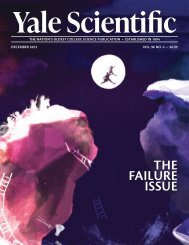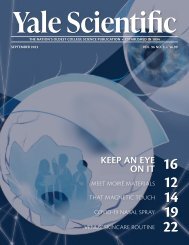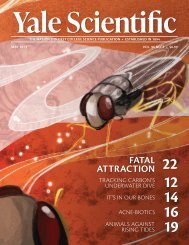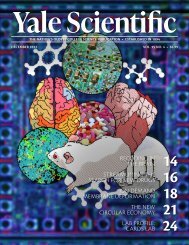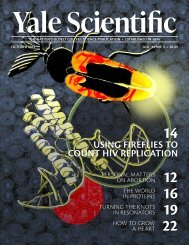YSM Issue 86.1
You also want an ePaper? Increase the reach of your titles
YUMPU automatically turns print PDFs into web optimized ePapers that Google loves.
BIOETHICS
decide more slowly decreased contributions.
Further variations of the game began with
writing prompts asking subjects to recall situations
when either intuitive or reflective thinking
had been beneficial. Whereas inducing an
intuitive mindset in subjects increased cooperation
priming a reflective mindset decreased
contributions. Together, these results suggest
that cooperation in social situations is intuitive,
but self-interest is rational.)
In the context of his study, Rand describes
cooperation as being “willing to make sacrifices
for the common good,” a definition
similar to Shim’s description of altruism as
Assistant Professor David Rand’s study
showed a negative correlation between
average cooperative contribution and
decision time. Courtesy of David Rand.
“deviation from self-interest in the direction
towards the community optimum.” Rand
considers the specific case of vaccination a
cooperative action: “Vaccination is a public
good. If everyone gets vaccinated, everyone is
better off.” According to the results of Rand’s
study, patients’ intuitive urge to cooperate
through vaccination competes with rational
adverseness to sacrificing self-interest.
Marketing against Misconception
Shim states that current vaccination campaigns
are beginning to address altruistic motivations
but adds, “I think they can do better.”
She suggests the campaigns can become more
persuasive by appealing to targeted age groups.
For example, because children have high
susceptibility and can easily spread disease,
the CDC should aim to protect the overall
population by focusing on persuading parents
that the benefits of vaccination outweigh the
risks. As children tend to
increase infection rates
among parents, vaccinating
both achieves a “dual
impact” of increased protection.
The most common
obstacle to this approach,
however, is popular misconception
of the risks of
vaccination.
In a follow-up research
article, Shim incorporated
patients’ perceptions
regarding vaccination and
the reasoning behind their
decisions. She comments,
“a lot of people choose
not to get the influenza vaccine because it is
inconvenient for them.” Additionally, “some
parents think it’s not safe to vaccinate their
kids.” Citing the perceived link between autism
and vaccines as an example, she explains that
while such claims are not supported scientifically,
they can shape the public perception and
stimulate fear.
Rand expresses a similar opinion on popular
misconceptions regarding the costs of vaccination.
He asserts, “It’s not like you are paying an
individual cost for the great good; it is in your
own interest to get vaccinated,” and proposes
that the CDC focus on communicating the
faultiness of misconceptions about personal
cost. If individuals gain a more accurate
understanding of the costs and benefits of
vaccination, the conflict between intuitive
cooperation and rational self-interest will be
minimized and vaccination will be viewed as
a gain for self-interest rather than a sacrifice.
Shim’s approach to increasing the effectiveness
of current vaccination campaigns
Assistant Professor David Rand researches the cognitive
mechanisms of human behavior. Courtesy of David Rand.
through altruism challenges the fundamental
assumption of epidemiological game theory
by suggesting potential for deviation from
self-interest. However, both she and Rand
also recognize the importance of appealing to
self-interest by correcting misconceptions. The
findings of each study, as well as the persuasive
strategies Shim and Rand propose, suggest that
vaccination campaigns should take both altruistic
cooperation and self-interest into account.
One of this year’s CDC publications urges
the reader to “get a flu vaccine to protect me,
my family, and my coworkers!” and promotes
the slogan “the FLU ends with U.” Another
brochure reads, “Flu viruses are unpredictable,
and every season puts you at risk. Besides…
You don’t want to be the one spreading flu, do you?”
Current vaccination campaigns appear to
recognize the importance of appealing both
to patients’ self-interest as well as their concern
for the common good — the issue that
remains is how to prioritize these persuasive
approaches most effectively.
About the Author
Jessica Hahne is a sophomore English major in Silliman College. She is a copy
editor and an online articles editor for the Yale Scientific Magazine.
Acknowledgements
The author would like to thank Dr. Eunha Shim and Dr. David Rand for their time
and enthusiasm about their research.
Further Reading
• Shim, Eunha, Gretchen B. Chapman, Jeffrey P. Townsend, and Alison P. Galvani.
“The influence of altruism on influenza vaccination decisions.” Journal of the Royal
Socciety Interface. 9. no. 74 (2012): 2234-2243.
www.yalescientific.org January 2013 | Yale Scientific Magazine 23




